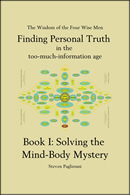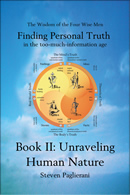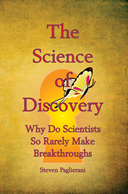
Solving the Mind/Body Mystery
(Book I in the Finding Personal Truth series)
978-0-9844895-0-3 $29.95
Will you find your personal truth in the too-much-information age?
In fifth grade, my class was told, it was likely none of us would ever have an original idea. It took me forty years to have my first, and twelve more to find the words to write about it. Along the way, I discovered a way to map the human mind, and a method to use this map. Together, they allow anyone who learns this method to find their personal truth.
Why the "Mind Body" Mystery?
All truth starts in your mind and body. Your mind and body shape your every thought and deed. Yet for four hundred years, no one's been able to tell us the exact nature of how these two "brains" interact.
In this book, you'll learn that it's your two senses of time that create the experience of a mind and body. Moreover, that when these two brains are out of sync, you become susceptible to everything from addictions and learning disabilities to relationship problems and child rearing dilemmas.
PHI015000 PHILOSOPHY / Mind & Body
PSY023000 PSYCHOLOGY / Personality
SCI075000 SCIENCE / Philosophy & Social Aspects
Science, Medicine, and Psychology (as what limits our minds)
By age four, our minds create a limited number of containers in which to store our life experience. We permanently store only those life experiences which fit into these containers. All others get discarded. Moreover, when it comes to human nature, we create three primary containers: the science container, the medicine container, and the psychology container. Here, the science container only stores thing which lead to answers. The medicine container only stores things which relate to things wrong with us; our brokenness. And the psychology container only store logical antidotes to this brokenness, pressuring us to look for reasons for everything which happens.
The problem is, answers create certainty and certainty closes the mind. Focusing only on brokenness creates the illusion that life is filled with suffering, even though it's but a small portion of life. And natural things do not happen for logical reasons. They happen for natural "reasons."
For instance, trees in New York have no leaves on them in winter because it is natural for them to lose their leaves in winter. This is not logical. It simply is. No coincidence, we are advised to remember, "post hoc, ergo prompter hoc." Just because something precedes something else doesn't mean the first thing caused the second. Yet despite this advice, our minds still insist there is a logic behind trees having no leaves.
Can we learn to see past these limitations? I for one so want to know. To be honest, I only recently discovered they exist. For now, what I've been doing is working hard to learn to see these containers in action, as they happen.
For instance, when someone tells me something which is natural (like that Sam woke up early today, or Brian ate eggs this morning), I'm learning to notice how quickly and automatically I assume logical causes for these events. Most people would even argue that these events do indeed happen for logical reasons. Yet no one wakes up thinking of reasons as they wake up. We wake and largely proceed based on the natural circumstances we find ourselves in. And these natural circumstances are not logical. They simply are.
Thus when someone "chooses" to eat eggs, they do this mainly because this fits their nature. Any actual, logical reasons emerge only after our natures become visible. And yes, these reason often accompany our actions, again, because the psychological container pressures us to be this way. But logic applies only to sequences, never to single points. Choosing to eat eggs is a single point.
Answers. Brokenness. Reasons. Our three invisible, mental filters.
Transcript of the Video
Something that has troubled me for many years has been the mystery of my clients' inability to explain what happens in my therapy room. I have been a therapist close to 30 years. I have been practicing emergence and expanding on this and creating a scientific method for over 20 years. And my main therapy when I sit people is to teach them human nature.
The difficulty is that they can easily see that they change. People around them remark that they change. They even are told it's very noticeable and that this hasn't been the kind of change that they've experienced before. However, when asked what is it you do in that room, what is it you do in therapy, every single person who has come to me and is coming to me has the same difficulty. Not a one of them can give what to them feels like an intelligent answer.
So this puzzle has bothered me for many years. And I have taught groups. And I have formal students. And many of the things that I try to pass to them they learn. But when it comes to telling other people the underlying concepts, how these things were arrived at, they have no way to say, even though I've literally filmed them, spoke to them, showed them, changed their lives with these things.
The other day I was at my dentist office getting drilled. And the office manager and the dental assistant, whom I know for quite awhile, came in the room and we were talking before the torture happened and . . . Not really. They've very kind people. But they came in and we're talking. And Susan, the office manager, asked me a question. She asked, what did I think causes people to be narcissistic?
OK. So first of all, I began by telling her that there were two things that would prevent her from hearing my answer. And these two women know me quite a while and they have had many conversations with me. But this was something I had never said to them before because it's something I'm just beginning to learn to talk about and notice.
And I said there are two things in the way that your brain functions, and everybody's brain functions, that will limit your ability to hear what I'm saying. I said that the first is psychology as a way to understand human nature. And that essentially means that supposedly everything happens for reasons. Relevant here because she's asking me the reason for people becoming narcissistic?
And the second thing I saw was the medical view, which is that if somebody's behavior, or appearance, or et cetera, is outside of the norm, significantly outside of the norm, and if people within the norm are troubled by being around this unusual person, generally this is seen as brokenness, not difference. Everything in personality has reasons behind it. And if the thing that's happening is a minority behavior, thoughts, feelings, then there must be something broken.
Having told her this, I went on to say, ask her, do you know the origin of the word "narcissistic," narcissism, the medical diagnosis? And she said vaguely something like, yes, it's something Greek, right? So I said my kind of layperson's sense of this.
And I said, Narcissus was a very beautiful man, who angered the gods. And so they punished him. And they chained him to a rock, by a beautiful pond. And he was then doomed to forever look at his beautiful image and nothing else in the reflection of that pond.
I asked her then, do you realize, that was a punishment? I gave her a minute to take it in. Both women were thinking about this. And I said each person who suffers from narcissism suffers from a terrible, terrible aloneness. They can only see themself.
It seemed to affect her. But, still, being that she has these two qualities, psychology as a way to understand cause for things and the medical view as a way to define health and brokenness, here I had addressed in part the medical part, that this is a condition which people suffer from, even if this is difficult to understand. But how does this condition come to be?
So I told her that every human being in the entire world, when born, is narcissistic. Of course, not broken, because I don't see it as brokenness. I see it as a state of mind. And that this is important because if they weren't narcissistic, they would likely die.
For instance, if the little being we're talking about is a little six-month-old baby girl, and it's 3:00 AM, and if she's suffocating and twisted up in blankets, and if she had to consider whether she should wake her parents or not, that it was the middle of the night and they probably wouldn't want to wake up, if she had to think about that, she'd likely die. So babies are born and remain in a state, for about the first year, of narcissism. They only see their own needs.
Who has needs to the baby? Me. Me. And that's what's in their cries. Me, what about me? Help me.
We then talked a little bit about that some people, about 25% of all people who are born, never leave that state. And I said those people are first year of life people, that state of personality, which I call the "me state," they can only see, who's needs? Me, my needs.
They remained in that state for life. It's not a quality of learning. It is a quality of being. And that many politicians, and many movie stars, and many famous athletes, many people who becomes adored by the public are ones, first year of life people. And that is really the meaning of narcissism.
I then went on to say that about 3/4 of people who don't remain in that first year of life state, they move on at around a year to the second state of being, character. And I told her about a story. It took place only a couple blocks from this dentist's office, by coincidence. And I was visiting a friend, a young therapist. And her first son was about 10 months old. I had seen the boy quite a number of times.
And he was in the other room. The house was essentially baby proof. There was nothing out, that we could imagine, that he would get into. However, babies are babies. He was in the next room. And it was very quiet. And so she said, it's too quiet.
We walked over to the doorway, looked across the room. And there he was. He had hoisted himself up at the pot of a fig tree. And he had a mouthful of dirt from the pot. And he had in his hand, the next mouthful.
Now, what he did is very important. And this changed my awareness of this me state and you state. It created a realization in me. I had an epiphany, an emergence. Because the boy, first he had his hand up. But first, he looked across the room at his mother, then at his hand, the next mouthful of dirt; then at his mother; then at his hand.
What is important to see is the order because at that point in his life, somewhat precociously, a little earlier than most babies who will make the change, he realized that other people have needs. And that is what that action is. He's looking out at his mother. And he realizes she may not want this to happen.
Now granted, this is a very primitive realization. There were no words in his mind, I'm sure. But the sense of it, the state of being is what's important. Because he was in what I call a "you state." Oh, you, you might have needs.
Now, I told them about 25% of people will remain in that second year of life state. And they are twos. And it happened that I said that these two states, they become part of us. Nobody knows how.
Immediately, Susan was asking, well, how do you get to be like that, the psychology? And I said, it is simply like how does this plant get to be taller than this plant? And how does this leaf live and this leaf get yellow? It's nature.
So I smiled. And I reminded her about the psychology and how hard it would be for her to understand this because she is looking for a logical explanation. But I went back, and I reminded her, and I said, now think about this idea of narcissism. And I asked her, evidently you have been affected by some narcissistic people, is that right? And she said yes, by many.
And I said, I'd venture a guess that you have been hurt by some of them. And she said yes again. And I said, do you realize that they never created this. They never chose this.
And not to say that they are not responsible because narcissistic people can be very hurtful. They don't realize you have needs. But do you realize that they're also very alone?
Both women were quiet for a minute or so. It was a lot to absorb, I'm sure. And I know that I can be overwhelming in how much I say. But right after that, the dentist came in and the drilling began.
On my way out, when I stopped to pay, Susan and I once again spoke for a little bit. And she had a very pensive look on her face. And she said, thank you.
So I tell this story because in that moment, I had hope about this. I had hope that in some way I'll find a path to get people to see past the idea that psychology implants in us, that the medical view imposes on us, and that the scientific method demands of us. The scientific method demands that we have answers. The medical view gets us to focus on what might go wrong or has gone wrong. And the psychological view is something that gets embedded in us when we, again, are young children.
How? When our parents say, why did you do that, at an age before we can tell time. It is only at the age at which we become able to tell time that we can put pieces together in time and think of cause and effect, that we can even think of logic.
Prior to that, if we're asked at three years old, why did you do that, by a parent who is angry, or frightened, or whatever, we soon learn to fabricate answers. And what kind of answers, logical answers. Logical answers satisfy. And answers, we demand those answers. And the parent feels relieved that nothing bad will happen in the future, because the child has been taught, or guided, or whatever.
Let me go through that once more, briefly, three things. The scientific method demands answers, not questions—answers. The medical view pressures us to focus on what might go wrong, what has gone wrong, what is wrong—brokenness. And the psychological view forces us to see everything that occurs as having a reason behind this occurrence, everything, certainly everything in human nature.
And where does this come from? These three things come from something that happens in every young child's early childhood. And that is that a parent, who gets frightened about something that has happened or might happen, dangerous, yells at a child, why did you do that? And this demand for an answer—scientific method—about something that has gone wrong or might go wrong—the medical view—is then answered by this child with something that approximates a reason.
That child knows if it gives a reason, and it's good enough, the anger of the parent, et cetera, the judgement of the parent, stops. And very early on, because children cannot understand cause and effect, they fabricate answers. They get better at fabricating as they grow older. And by seven, they're really good at it.
And when a teacher asks in a classroom for something, they fabricate answers. And when the wife asks her husband, a rather quiet man, why didn't you say anything? He fabricates an answer. And when the police stops your car and says, do you realize how fast you were going? You fabricate an answer—scientific method, answers; medical view, something going wrong; psychology, there are reasons behind everything.
Books by Steven Paglierani



.png)
_978-0-9844895-0-3.jpg)